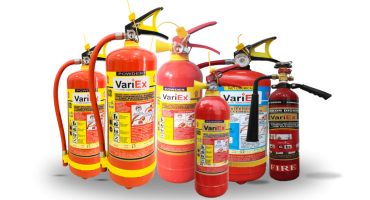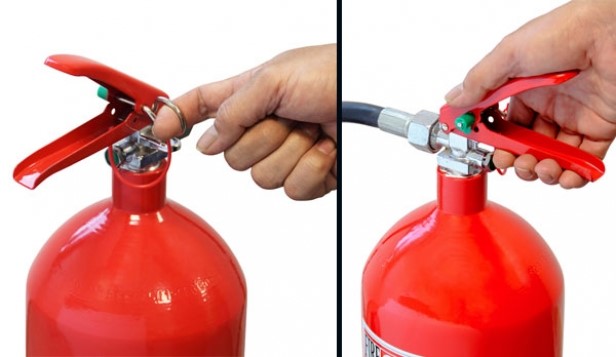![]()
Fire Immuniser
+91-7829629111
Email: info@variex.in
Varistor Technologies Pvt. Ltd.
Block-1, First Floor, Ardente Office One, Hoodi Circle, ITPL Main Road, Bengaluru, Karnataka 560048, IN
What Happens If You Dont Recharge A Fire Extinguisher?
Introduction
Fire extinguishers are crucial safety tools that can prevent small fires from turning into full-fledged disasters. They are designed to be reliable and effective when used correctly. However, many people are unaware that fire extinguishers require regular maintenance, including recharging. Neglecting the recharge process can render a fire extinguisher useless in a time of need, potentially leading to devastating consequences. In this article, we explore what happens when you fail to recharge a fire extinguisher, highlighting the importance of regular maintenance and the potential risks involved.
1. Loss of Pressurization
Fire extinguishers work by expelling pressurized substances, such as water, foam, or chemical agents, to smother flames. Over time, the pressurized substance inside the extinguisher can slowly escape, leading to a loss of pressure. This loss of pressurization occurs naturally, even without using the extinguisher. Regular recharging ensures that the extinguisher maintains the required pressure to deliver an effective firefighting agent. Failing to recharge the extinguisher can cause a significant reduction in pressure, rendering it ineffective in combating fires.
2. Decreased Firefighting Capability
When a fire extinguisher is not recharged, its firefighting capabilities diminish. As the pressure drops, the extinguishing agent may not be able to reach the fire with the required force and coverage. Without proper pressure, the fire extinguisher may only emit a weak stream of substance that is insufficient to suppress the flames effectively, providing little to no protection. In critical situations, even a few seconds can make a significant difference, and an unrecharged fire extinguisher can lead to inadequate and ineffective firefighting.
3. Inability to Combat Different Fire Types
Different fires require specific types of extinguishing agents to subdue them effectively. Fire extinguishers are classified according to the type of fire they can handle, such as Class A, B, C, D, or K. If a fire extinguisher is not recharged regularly, it may become depleted of the particular agent required for a specific class of fire. For instance, if a Class A fire extinguisher containing water is not recharged, the water may evaporate or become contaminated, leaving it ineffective against Class A fires. Neglecting to recharge a fire extinguisher reduces its ability to combat different fire types, potentially exacerbating the situation and endangering lives.
4. Increased Fire Spread and Property Damage
When a fire extinguisher is not recharged or in optimal working condition, fires can spread uncontrollably. Without the necessary pressure and firefighting agent, a small fire can quickly escalate into a larger blaze, especially in situations where immediate action is crucial. The inability to combat the fire effectively may result in increased property damage, putting lives at risk. By neglecting to recharge a fire extinguisher, the potential for more extensive fire damage and severe consequences for the occupants of a building or space significantly increases.
5. Legal and Regulatory Compliance
Recharging fire extinguishers is not only essential for safety but also a legal requirement in many jurisdictions. Fire safety regulations often mandate regular maintenance routines for fire extinguishers, which include recharging. Failing to comply with these regulations can result in penalties, fines, and potential liability issues. By neglecting to recharge fire extinguishers, individuals and businesses risk facing legal consequences along with the potential dangers of ineffective fire protection.
Conclusion
Regularly recharging a fire extinguisher is crucial to ensuring its effectiveness and reliability during an emergency. Neglecting to recharge a fire extinguisher results in a loss of pressurization, decreased firefighting capabilities, an inability to combat different fire types, increased fire spread and property damage, and non-compliance with legal and regulatory requirements. It is essential to prioritize the proper maintenance of fire extinguishers, ensuring they are recharged as recommended by the manufacturer and regulatory authorities. By doing so, we can significantly enhance our fire safety measures and minimize the potential risks and damages associated with fires.
Final Say
We at VariEx.in or Variexonline.com have mastered the art of designing, installing, inspecting, and fixing automatic sprinkler systems with the help of our in-house team, which is capable of delivering the fire sprinkler services you need, whether large or small and at affordable cost.
To schedule a fire sprinkler installation, or you think our services could benefit your commercial property, contact us online or give us a call at, 7829629111
"WHAT YOU CAN READ NEXT"
 Read more +24 November 2023 in Fire Extinguisher
Read more +24 November 2023 in Fire ExtinguisherWhat types of fire extinguishers are available for different fire classes?
 Read more +11 July 2025 in Fire Suppression
Read more +11 July 2025 in Fire Suppression







